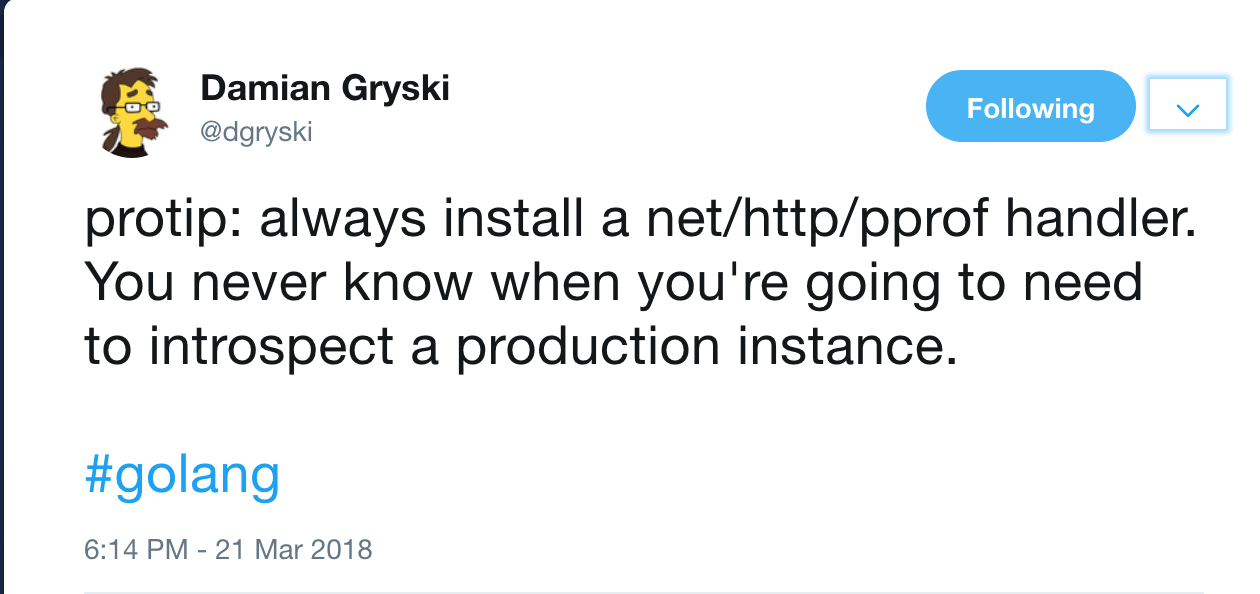kca.id.au
What is Go?
- Released in 2009
- Developed with the Google service workload in mind
- Big focus on Concurrency
- Statically typed
Useful bits?
- Developed for Google *
- Easy Concurrency *
- Quick to learn *
- Built to be read *
- Error handling. There are no exceptions *
- Opinionated *
- Statically compiled *
- Gopath! *
- go fmt
You could also say
- Boring
- Old Fashioned
- No Package tools
- No generics
- Worse concurrency that erlang
- Built for organisations much larger than you
- Inflexible
- No generics
- Made for “mediocre” programers
YMMV
A larger list can be found at github.com/ksimka/go-is-not-good
Why Should you go?
- Simple and boring
- Concurrent
- Testing
- Excellent cross compilation
- Simple deployment process
- Operation tooling
Boring
- Go is no longer exciting
- Compatibility guarantees that hold
- Error checking is painful but less painful than errors
- Old enough that language rants are no longer hosted
Simple
Mandatory Hello World
package main
import "fmt"
func main() {
fmt.Println("Hello, 世界")
}
Artificial example
func echoConn(conn net.Conn) {
defer conn.Close()
for {
buf := make([]byte, 1024)
size, err := conn.Read(buf)
if err != nil {
return
}
data := buf[:size]
conn.Write(data)
}
}
func main() {
l, err := net.Listen("tcp", ":8081")
if err != nil {
panic(err)
}
defer l.Close()
for {
conn, err := l.Accept()
if err != nil {
panic(err)
}
echoConn(conn)
}
}
Concurrency

func main() {
l, err := net.Listen("tcp", ":8081")
if err != nil {
panic(err)
}
defer l.Close()
for {
conn, err := l.Accept()
if err != nil {
panic(err)
}
go echoConn(conn)
}
}
Racy behaviour

go test -race ./...
go run -race main.go
Testing

func Fib(n int) int {
if n < 2 {
return n
}
return Fib(n-1) + Fib(n-2)
}
func TestFib(t *testing.T) {
tests := []struct {
name string
arg int
want int
}{
// TODO: Add test cases.
}
for _, tt := range tests {
t.Run(tt.name, func(t *testing.T) {
if got := Fib(tt.args.n); got != tt.want {
t.Errorf("Fib() = %v, want %v", got, tt.want)
}
})
}
}
func benchmarkFib(i int, b *testing.B) {
for n := 0; n < b.N; n++ {
Fib(i)
}
}
...
func BenchmarkFib20(b *testing.B) {
benchmarkFib(20, b)
}
func BenchmarkFib40(b *testing.B) {
benchmarkFib(40, b)
}
$ go test -bench=. -benchmem
goos: windows
goarch: amd64
pkg: github.com/kcollasarundell/austnet/mondo/fib
BenchmarkFib1-4 1000000000 2.32 ns/op 0 B/op 0 allocs/op
BenchmarkFib2-4 200000000 6.66 ns/op 0 B/op 0 allocs/op
BenchmarkFib3-4 100000000 11.0 ns/op 0 B/op 0 allocs/op
BenchmarkFib20-4 30000 48133 ns/op 0 B/op 0 allocs/op
BenchmarkFib40-4 2 725500700 ns/op 0 B/op 0 allocs/op
BenchmarkFib10-4 5000000 378 ns/op 0 B/op 0 allocs/op
PASS
ok github.com/kcollasarundell/austnet/mondo/fib 12.314s
$ benchcmp old.txt new.txt
benchmark old ns/op new ns/op delta
BenchmarkConcat 523 68.6 -86.88%
benchmark old allocs new allocs delta
BenchmarkConcat 3 1 -66.67%
benchmark old bytes new bytes delta
BenchmarkConcat 80 48 -40.00%
package fib_test
import (
"fmt"
"github.com/kcollasarundell/hugo/tmpfiles/fib"
)
func exampleFib() {
fmt.Println(fib.Fib(10))
// Output: 55
}
% go test . -v
=== RUN TestFib
--- PASS: TestFib (0.00s)
=== RUN ExampleFib
--- PASS: ExampleFib (0.00s)
PASS
ok github.com/kcollasarundell/hugo/tmpfiles/fib 0.010s
Cross compilation

CGO_ENABLED=0 GOOS=linux GOARCH=amd64 go build -o linux_amd64_binary
CGO_ENABLED=0 GOOS=linux GOARCH=arm64 go build -o linux_arm64_binary
CGO_ENABLED=0 GOOS=darwin GOARCH=amd64 go build -o osx_amd64_binary
CGO_ENABLED=0 GOOS=windows GOARCH=amd64 go build -o windows_amd64_binary
Simple deployment process

FROM golang:latest AS builder
# Copy the code from the host and compile it
WORKDIR $GOPATH/src/github.com/username/repo
COPY . ./
RUN CGO_ENABLED=0 GOOS=linux go build -a -installsuffix nocgo -o /descriptiveName .
FROM scratch
COPY --from=builder /descriptiveName ./
COPY --from=builder /etc/ssl/certs/ca-certificates.crt /etc/ssl/certs/ca-certificates.crt
ENTRYPOINT ["./descriptiveName"]
package main
import (
"net/http"
"github.com/gobuffalo/packr"
)
func main() {
box := packr.NewBox("./templates")
http.Handle("/", http.FileServer(box))
http.ListenAndServe(":3000", nil)
}
packr && go build
Operation tooling


insert Demo of pprof that i am too lazy to record so go read @b0rk or @rakyll
What’s next
References
kca.id.au
 @kcollasarundell
@kcollasarundell